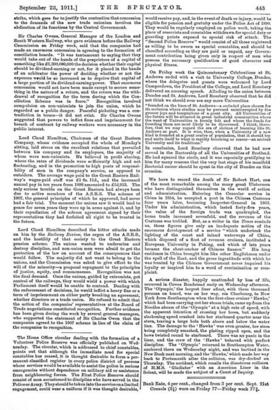Sir Charles Owens, General Manager of the London and South
Western Railway, who gave evidence before the Railway Commission en Friday week, said that the companies had made an enormous concession in agreeing to the formation of conciliation boards. "It was tantamount to saying that they would take out of the bands of the proprietors of a capital of something like £1,300,000,000 the decision whether their capital should be dividend-earning or not, for it placed in the hands of an arbitrator the power of deciding whether or not the expenses would be so increased as to deprive that capital of a large portion of its dividend-earning power. That enormous concession would not have been made except to secure some- thing in the nature of a return, and the return was the with- drawal of recognition for the term during which the Con- ciliation Scheme was in force." Recognition involved compulsion on non-unionists to join the union, which he regarded as a public danger. Peaceful picketing was a con- tradiction in terms—it did not exist. Sir Charles Owens suggested that powers to inflict fines and imprisonment for breach of contract by railway workers were necessary in the public interest.






































 Previous page
Previous page